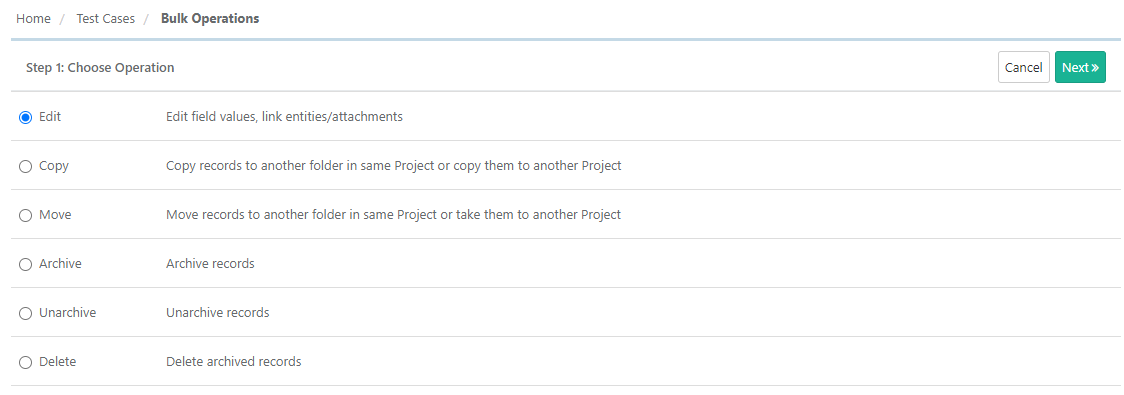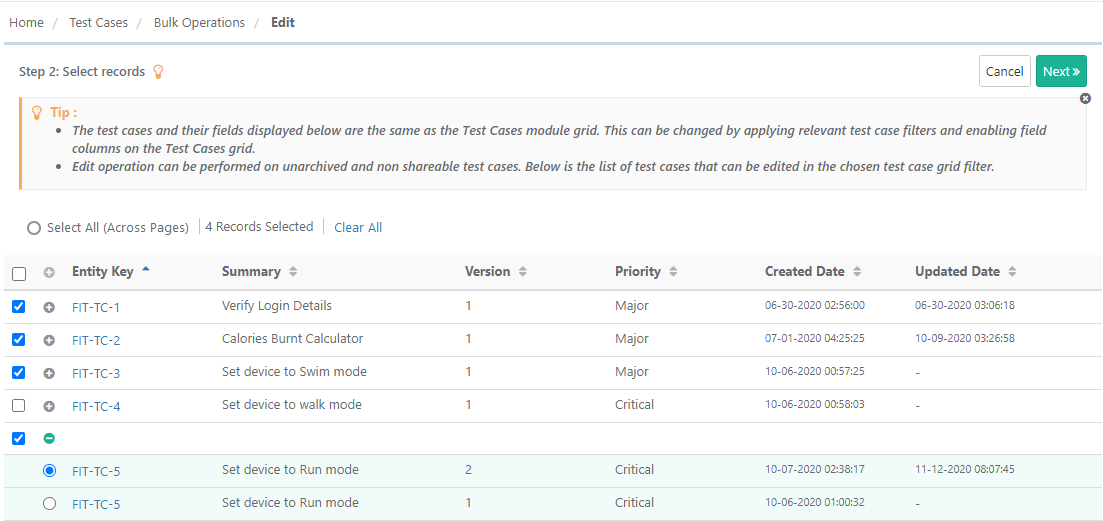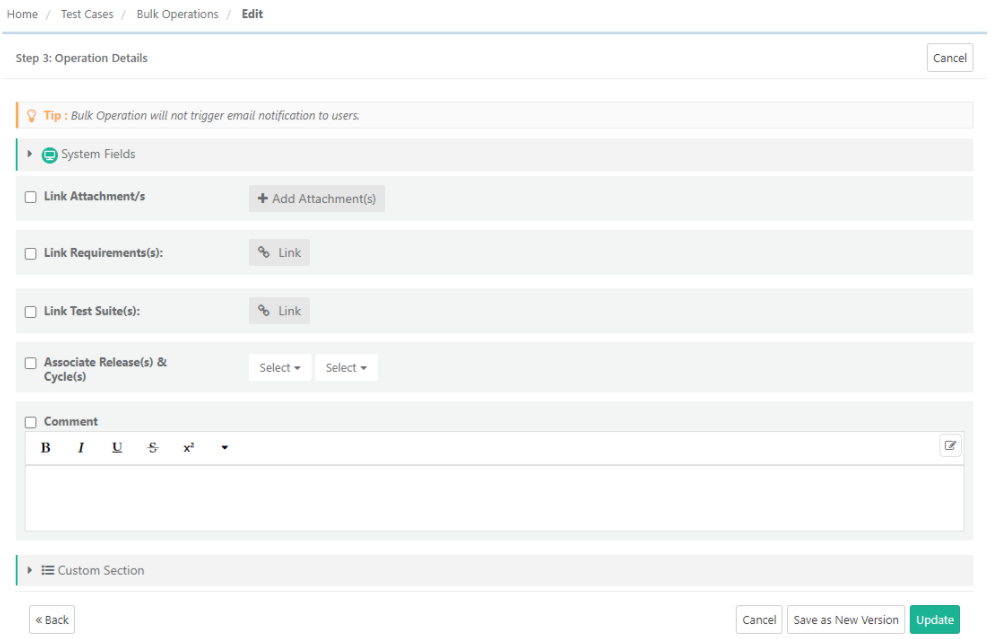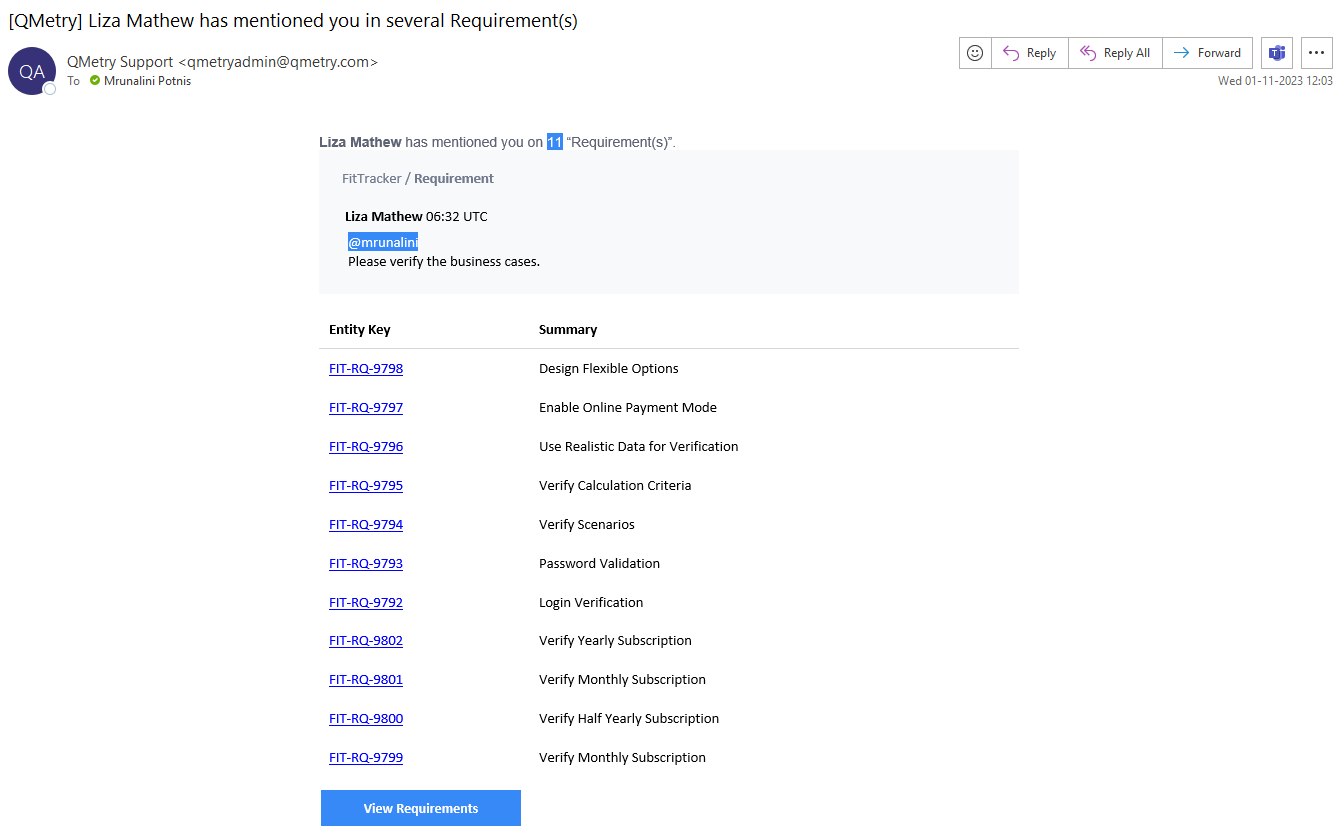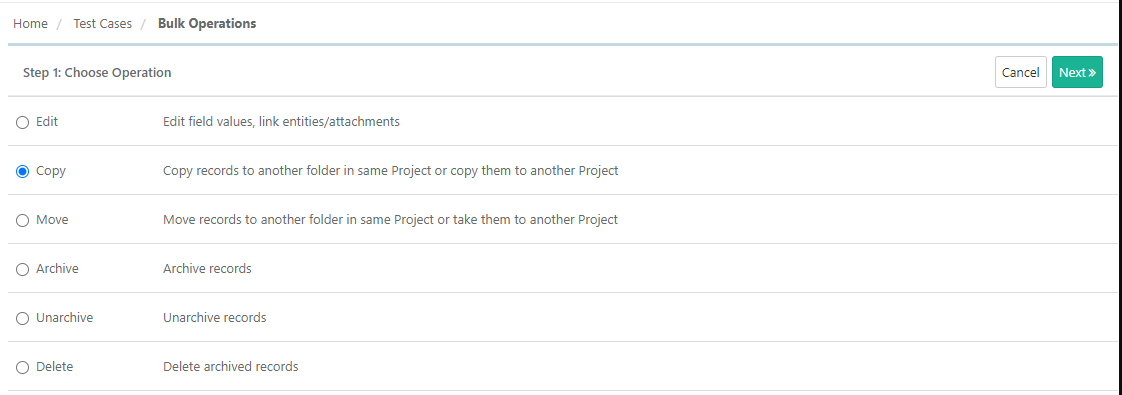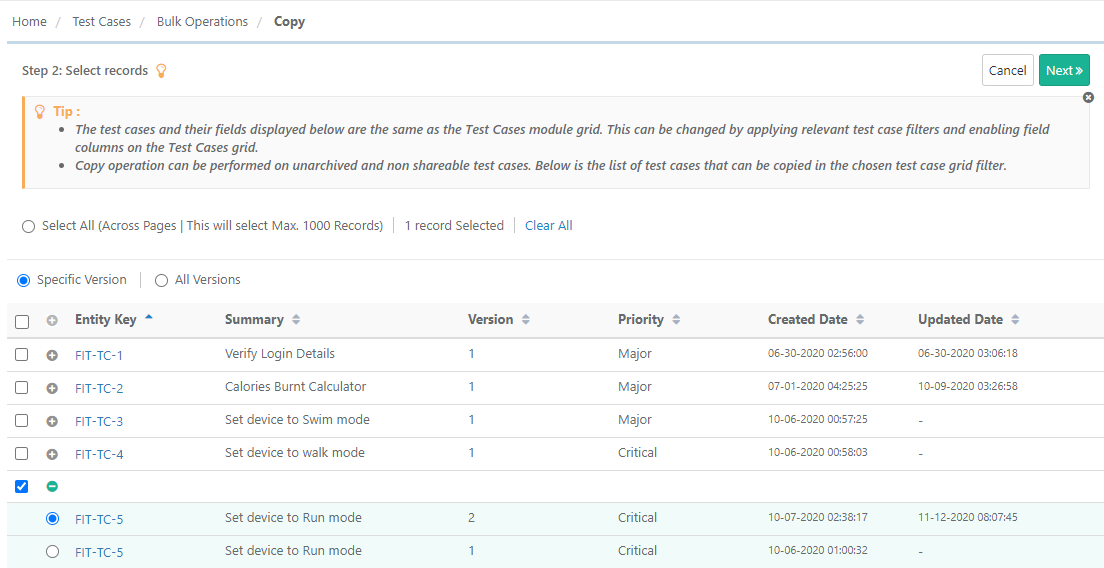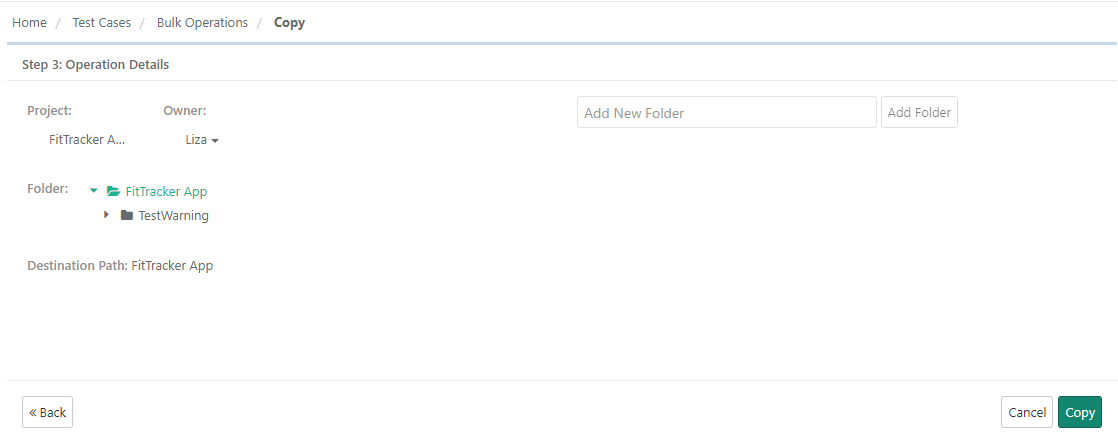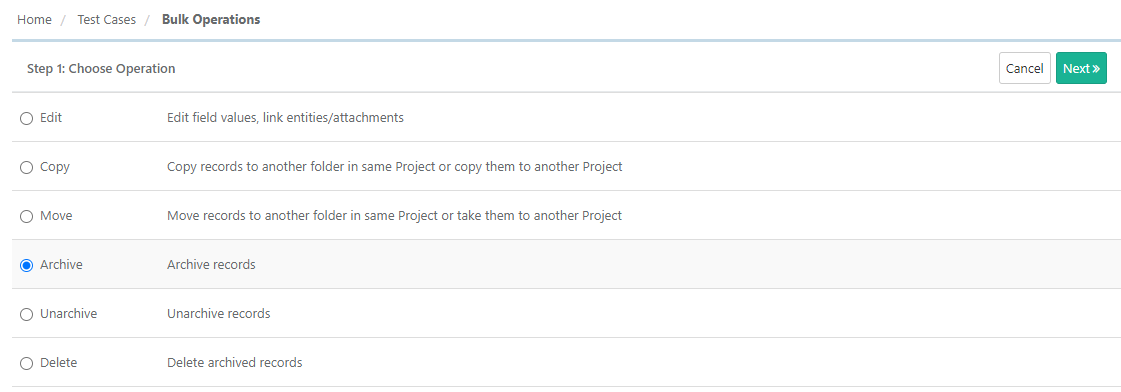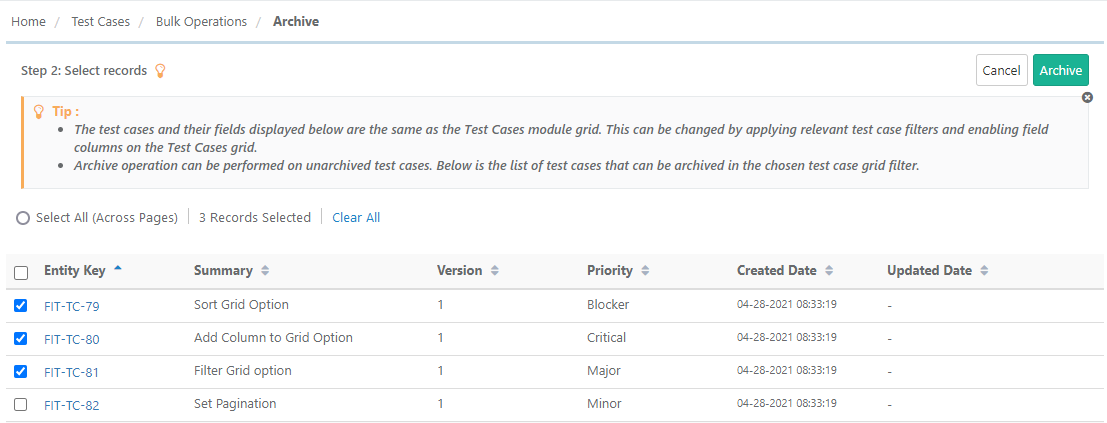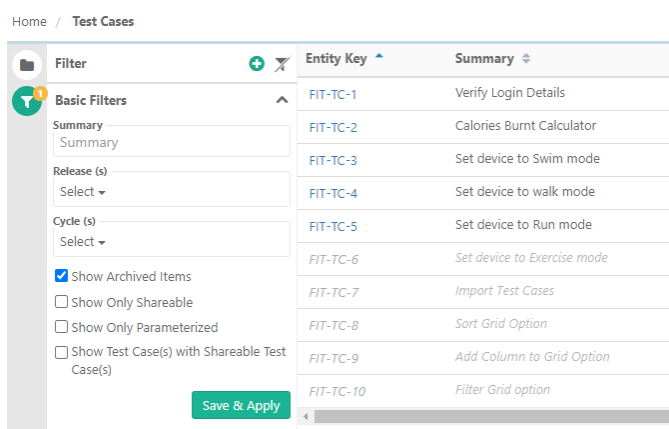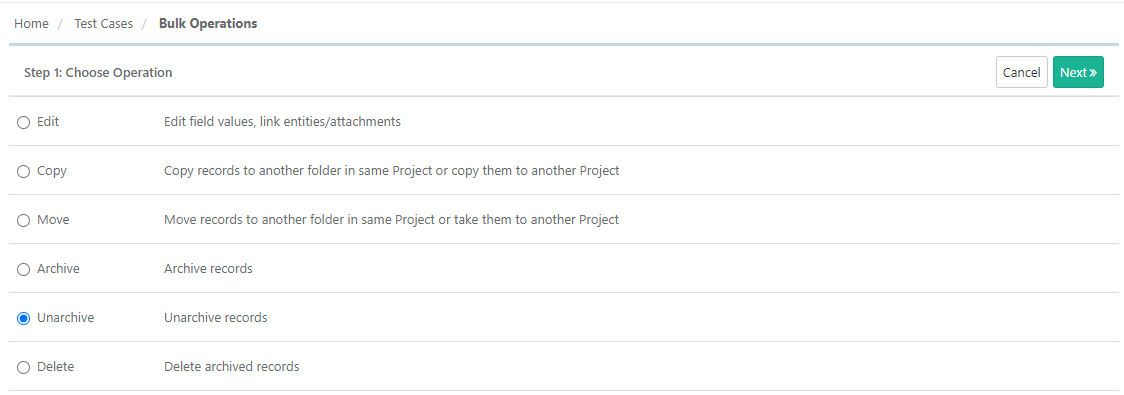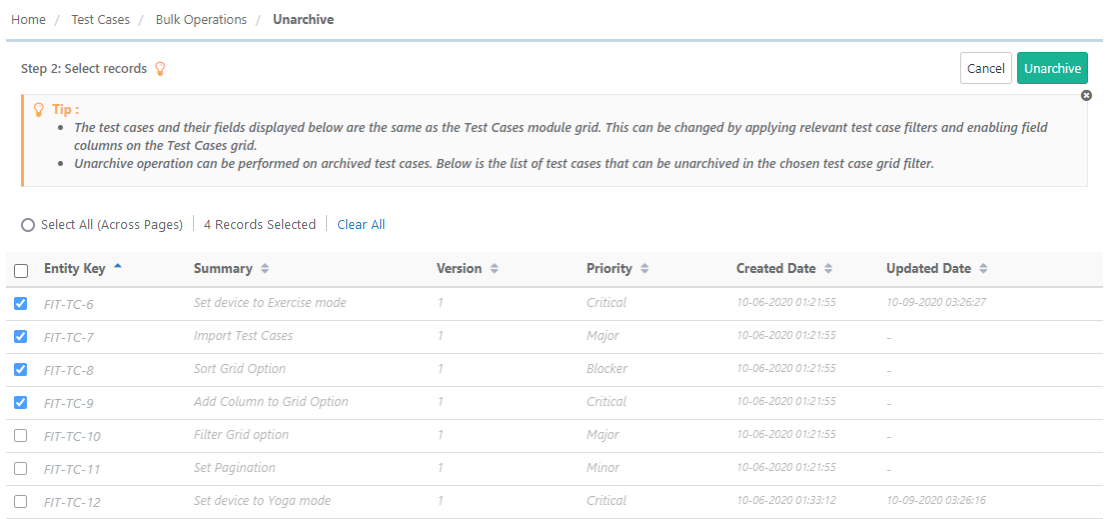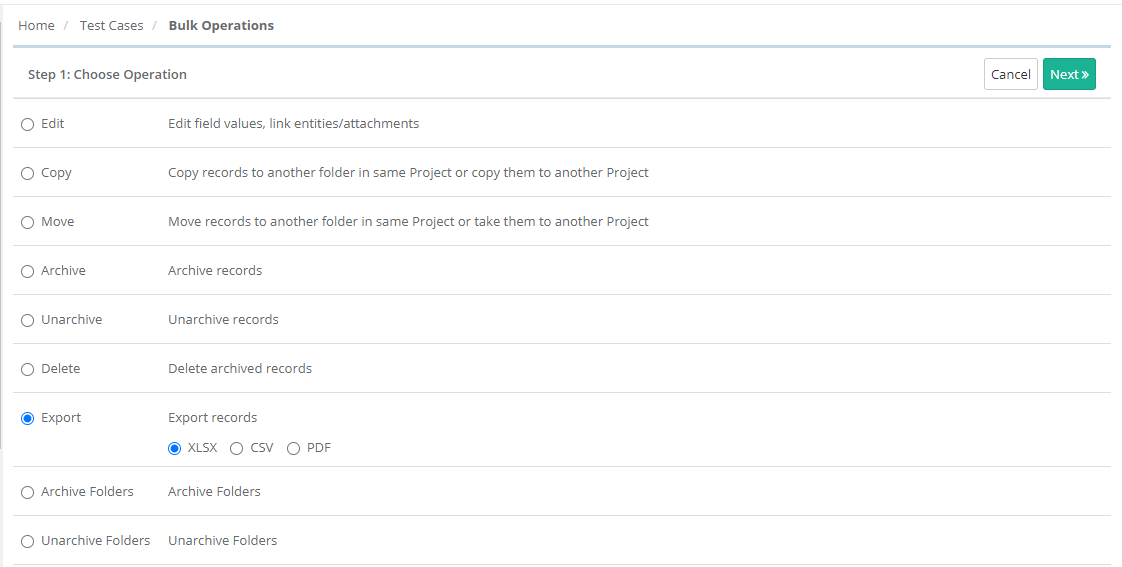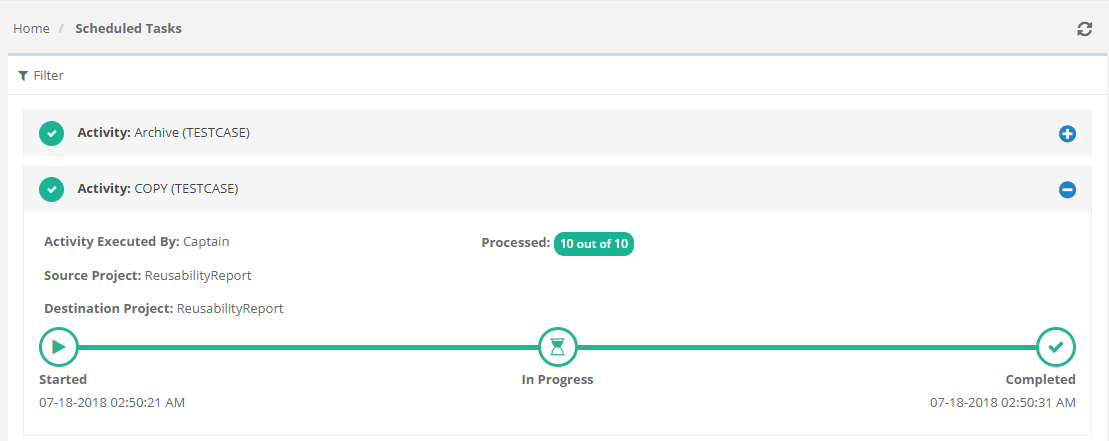Back to QMetry All Products Help Page
Bulk Operations
The Bulk Operation feature is provided to perform -
|
|
|
Notes:
- Filters applied on folders, system, custom, or Jira fields on the module are carried forward to the bulk operations. This allows performing bulk operations by filtering on all the fields.
- Fields enabled on the module grid are also enabled while selecting records on the bulk operations screen.
When Jira is integrated with the project, requirements can be filtered on Jira fields. Users can then perform bulk operations on filtered records.
From where to access the Bulk Operation feature?
Open Test Case module list view.
Click on the Con icon at the top right corner on the toolbar and select Bulk Operations.
Users can apply filter on test cases from the Test Cases module main screen. Filters applied on folders, system or custom fields on the module are carried forward to the bulk operations. With this, the bulk operations can be performed by filtering on all the fields. Fields enabled on the module grid are also enabled while selecting records on the bulk operations screen.
The table below show what operations you can perform for different test assets.
Module/Operation | Copy | Move | Edit | Delete | Archive | Unarchive | Approve | ||
|---|---|---|---|---|---|---|---|---|---|
Within Same Project | Across Project | Within Same Project | Across Project | ||||||
Requirement | Y | Y | Y | Y | Y | Y | Y | Y | Y |
Test Case | Y | Y | Y | Y | Y | Y | Y | Y | Y |
Test Suite | Y | N | Y | N | Y | Y | Y | Y | Y |
Issue* | Y | Y | Y | Y | Y | Y | NA | NA | NA |
Platform | NA | NA | NA | NA | NA | Y | Y | Y | NA |
* Issues should have been created only in QMetry. Bulk Operations could not be carried out on issues imported from Jira.
Bulk Edit
Step 1 Select the Edit operation you want to perform on the assets and click Next.
Step 2 Select assets: The next screen displays records with check box. Select assets on which you want to perform bulk operations by selecting check boxes and then click Next.
- Specific Version: You can select a particular Version of the test case to edit. Test Cases with multiple versions are expandable and you can view all the available versions for the test case.
Use Case: Each version of the test case is expandable so that users can view details of all versions at one place.
Expand the test case and select the required version you want to edit.
Step 3 Operation Details: The screen depends on the operation you selected in Step 1 above.
For example, for the Edit operation, the screen opens with fields for editing bulk test cases.
Bulk Operations for Test Cases:
- Bulk link Test cases with Requirements.
- Bulk edit specific versions of test cases.
- Bulk link attachments.
- Bulk link Releases and Cycles.
Bulk Operations for Requirements:
- Bulk link Requirements with Test cases Issues.
- Bulk edit specific versions of Requirements.
- Bulk link attachments.
- Bulk link Releases and Cycles.
Bulk Operations for Test Suites:
- Bulk link Test suites with Platforms & Test cases.
- Bulk link attachments.
- Bulk link Releases and Cycles.
Once you are done changing field values, click either Save as New Version or Update for requirements/test cases. (In case of test suites, click Update.)
Bulk Comment
Go to Bulk Operations.
Step 1 Choose Operation: Select Edit as the operation to perform and click Next.
Step 2 Select records
- Select requirement records which are to be commented. If you want to add comment in all the requirements across pages then select the Select All (Across Pages) option.
- You can apply Filter to search specific records based on different criteria.
Step 3 Operation Details: The screen depends on the operation you selected in Step 1 above.
For example, for Edit operation, the screen opens with fields for editing bulk requirements.
- Add comments in the Comments field. Observe that the edited fields gets selected automatically.
- Save the changes, click either Save as New Version or Update for requirements/test cases. (In case of test suites/issues, click Update.)
Tagging Users in Comments
You can also tag users for adding bulk comments (through Bulk Operations > Edit). In this case, a single notification will be sent to the tagged users for multiple test assets. The email contains Keys, a Summary, and a Comment on the assets.
The following image shows the email received on Bulk Edit of requirements with tagging users in the Comment field.
Bulk Copy
Users can copy requirements within project and across project. The destination project should have the required user defined fields that are used in the source project.
A user can move/copy requirements to the destination folder or a root folder of destination project.
Requirement and specified version copy/move have the following options:
Go to Bulk Operations.
Step 1 Choose Operation: Select Copy as the operation to perform and click Next.
Step 2 Select records
1. Select test case records that are to be copied. If you want to copy all the test cases across pages then select the Select All (Across Pages) option. Maximum 1000 records can be selected at a time.
2. You can apply Filter to search specific records based on different criteria. It will help you pick required test cases and narrow down the test case count to be copied.
- Specific Version: You can select a particular Version of the test case to copy. Test Cases with multiple versions are expandable and you can view all the available versions for the test cases.
Use Case: Each version of the test case is expandable so that users can view details of all versions at one place.
Expand the test case and select the required version you want to copy.
- All Versions: If this option is selected, then the Version button is disabled. Users can not select a particular version of the test case.
- Project: You can copy test cases within same project and across projects. Select the destination Project you want to copy the selected test cases to.
- Owner: Select Owner of the requirements in the destination project. The Owner list is populated as per the Project selection.
- Folder: Select the folder in which you want to copy the selected test cases. To create a new folder in the destination project, enter folder name in the box and click on the Add Folder button. The new folder is added on the Folder tree.
- Destination Path: The Destination Path is displayed according to the Folder selection on the tree. You can also create a new folder to add to the tree.
Click Copy.
Bulk Move
The process is same as Bulk Copy except the version selection. Test Assets will be moved with all their existing versions.
What will be copied/moved with test assets?
| Operation | Same Project | Across Project |
|---|---|---|
| Copy | For the selected /all versions it will copy assets with all attachments, linkage of requirements, test cases, release, cycle , issues (linked with Requirement ) | For the selected/all versions it will copy assets with all attachments |
| Move | For the selected /all versions it will copy assets with all attachments, linkage of requirements, test cases, release, cycle , issues (linked with Requirement ) | For the selected/all versions it will move assets with all attachments |
Bulk Archive
Archive Requirements/Test Cases/Test Suites
Go to Bulk Operations.
Select Archive as operation to perform and click Next.
Select test case records which are to be archived and click on the Archive button. Confirm the operation on the dialogue window.
To view archived records along with other records on the test case list view, apply Basic Filters on the tree pane.
Select the Show Archived check box.
The following operations will be available for archived assets:
- Unarchive: Unarchive selected test cases.
- Delete: Delete archived test cases.
Bulk Unarchive
1. Go to Bulk Operations.
2. Select Unarchive as the operation to perform and click Next.
The screen shows archived records.
3. Select the records you want to unarchive and click on the Uarchive button.
Bulk Delete
All the versions of requirement/test case should be archived to delete that particular requirement/test case.
It is a two steps process:
- Archive assets
- Delete archived assets
Step 1 Choose Operation: To delete requirements, select Delete as operation on screen and click Next.
Step 2 Select records: The screen shows archived records. Select records you want to delete by checking check boxes. To select all the records across pages select the Select All option.
Once you are done with selecting the records, click on the Delete button. Confirm the operation on the dialogue window that pops up.
The success message appears with the options to:
- Go Back: It will navigate you to the module screen.
- Perform another operation: Clicking on the button will navigate you to the Step 1 of Choose Operation.
Bulk Export
You can export details of test asset in XLSX and CSV.
- Go to Bulk Operations.
- Select Export and click Next.
Refer to Export from QMetry for more details on Export.
View the Progress of Bulk Operation
When you complete the bulk operations, the message pops up to view notifications for the operations. You can view the progress in the notification window on the application header. This allows scheduled operations to run in the background and allows users to continue with their other work.
Check the notification window on the application header. It shows the list of Activities.
Scheduled Task
Click on the Scheduled Task icon the application header. The Scheduled Task icon turns Orange in color whenever any of the following actions is initialized. The icon color changes to original as soon as you click on it to view the task status.
- All bulk operations
- Import - IS, TC, TS, RQ
- Export - IS, TC, TS, RQ, Test execution
- Project clone
The screen shows all the activities completed or in queue.
Related content
Back to QMetry All Products Help Page

